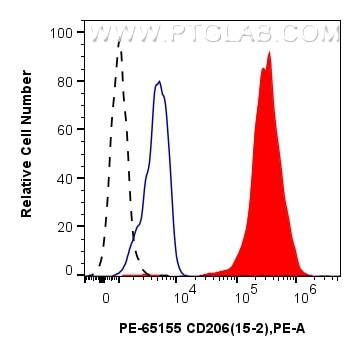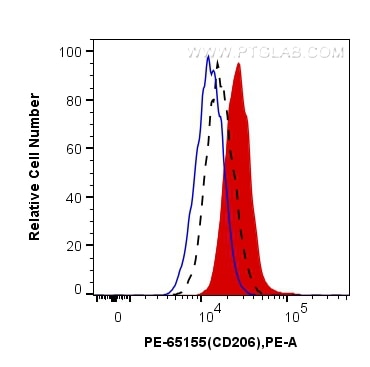Validation Data Gallery
Tested Applications
| Positive FC detected in | GM-CSF treated human PBMCs |
Recommended dilution
| Application | Dilution |
|---|---|
| This reagent has been pre-titrated and tested for flow cytometric analysis. The suggested use of this reagent is 5 µl per 10^6 cells in a 100 µl suspension or 5 µl per 100 µl of whole blood. | |
| Sample-dependent, Check data in validation data gallery. | |
Published Applications
| FC | See 9 publications below |
Product Information
PE-65155 targets CD206 in FC applications and shows reactivity with human samples.
| Tested Reactivity | human |
| Cited Reactivity | human |
| Host / Isotype | Mouse / IgG1, kappa |
| Class | Monoclonal |
| Type | Antibody |
| Immunogen | Purified human mannose receptor 相同性解析による交差性が予測される生物種 |
| Full Name | mannose receptor, C type 1 |
| Calculated molecular weight | 166 kDa |
| GenBank accession number | NM_002438 |
| Gene Symbol | CD206 |
| Gene ID (NCBI) | 4360 |
| RRID | AB_2920521 |
| Conjugate | PE Fluorescent Dye |
| Excitation/Emission maxima wavelengths | 496 nm, 565 nm / 578 nm |
| Form | Liquid |
| Purification Method | The purified antibody is conjugated with R-phycoerythrin (PE) under optimum conditions. The conjugate is purified by size-exclusion chromatography. |
| UNIPROT ID | P22897 |
| Storage Buffer | PBS with 0.09% sodium azide and 0.5% BSA , pH 7.3 |
| Storage Conditions | Store at 2-8°C. Avoid exposure to light. Stable for one year after shipment. |
Background Information
CD206, also named as MMR, CLEC13D and MRC1, is a type I membrane receptor that mediates the endocytosis of glycoproteins by macrophages. CD206 has been shown to bind high-mannose structures on the surface of potentially pathogenic viruses, bacteria, and fungi so that they can be neutralized by phagocytic engulfment. CD206 is a 170 kDa transmembrane protein which contains 5 domains: an amino-terminal cysteine-rich region, a fibronectin type II repeat, a series of eight tandem lectin-like carbohydrate recognition domains (responsible for the recognition of mannose and fucose), a transmembrane domain, and an intracellular carboxy-terminal tail. It is expressed on most tissue macrophages, in vitro derived dendritic cells, lymphatic and sinusoidal endothelia.
Protocols
| Product Specific Protocols | |
|---|---|
| FC protocol for PE CD206 antibody PE-65155 | Download protocol |
| Standard Protocols | |
|---|---|
| Click here to view our Standard Protocols |
Publications
| Species | Application | Title |
|---|---|---|
Oncogene Dual role of pseudogene TMEM198B in promoting lipid metabolism and immune escape of glioma cells | ||
J Agric Food Chem Polysaccharide from Ziyang Selenium-Enriched Green Tea Prevents Obesity and Promotes Adipose Thermogenesis via Modulating the Gut Microbiota | ||
Eur J Histochem Tumor cells-derived exosomal PD-L1 promotes the growth and invasion of lung cancer cells in vitro via mediating macrophages M2 polarization | ||
J Agric Food Chem Novel Collagen Analogs with Multicopy Mucin-Type Sequences for Multifunctional Enhancement Properties Using SUMO Fusion Tags | ||
Front Immunol Profiling hypoxia signaling reveals a lncRNA signature contributing to immunosuppression in high-grade glioma | ||
Int J Oncol Cinobufagin inhibits M2‑like tumor‑associated macrophage polarization to attenuate the invasion and migration of lung cancer cells |

